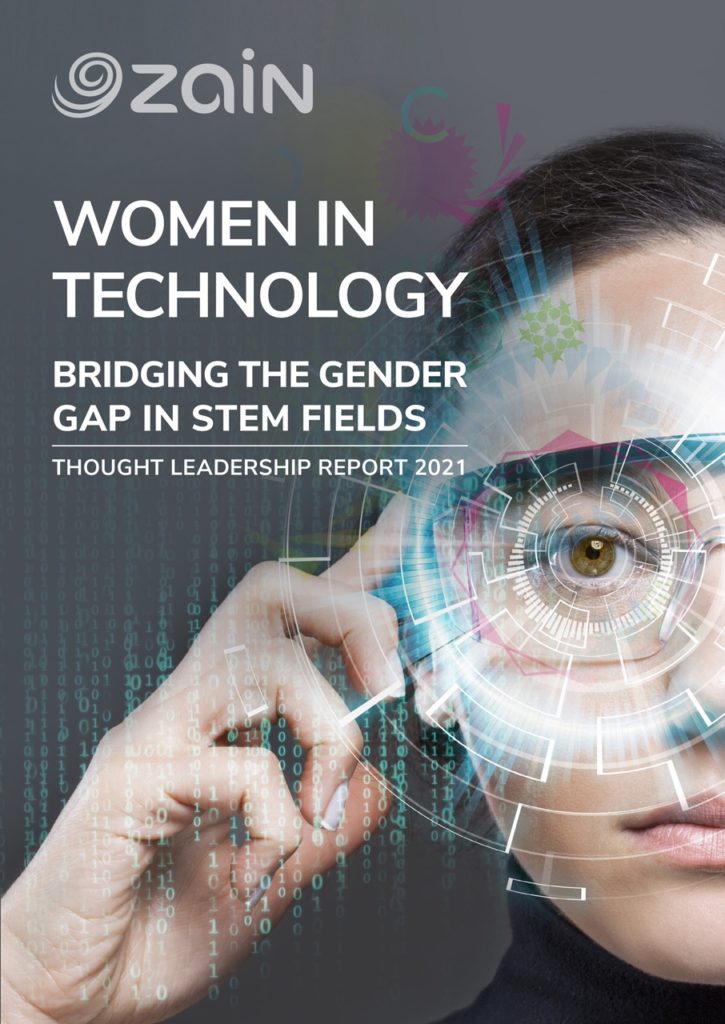
Zain Group, the leading mobile telecom innovator in seven markets across the Middle East and Africa, announces the publication of its annual thought leadership report, this year entitled, Women in Technology – Bridging the Gender Gap in STEM Fields. It provides insights on the gender gap in science, technology, engineering, and math (STEM), highlighting the impact on socio-economic development across the board.
The release of the report, which coincides with International Women’s Day, explores several important issues regarding the cause, nature, and effects of the challenges faced by women as related to STEM, and the prejudices they face even upon entering professions related to the subject area. The publication delves into aspects of gender disparity; the gender digital divide; literacy and STEM education; as well as employment equality.
Bader Al-Kharafi, Zain Vice-Chairman and Group CEO commented, “The role of women in tech needs to be increased. It is that simple. Zain is continually driving equality programs, recognizing the need to push an agenda that is cohesive, inclusive, and fair to all. This thought leadership report is another tool to highlight the extent of the exclusion of women from STEM-related fields, and what is needed to close the gender gap across the region and beyond.”
Al-Kharafi added, “Since the launch of our Gender Diversity initiative, we have invested in certifying over 100females within Zain on the fundamentals of Data Analytics and Science. These colleagues then went on to take part in our groupwide 12-hour datathon in April 2020 at the height of pandemic, and are now part of a talent pool of resources we tap into for tech related projects across our footprint. WE will continue to inspire learning through practice, and the engagement in this datathon has proven the resilience of our talented pool of women in STEM.”
Jennifer Suleiman, Zain Group’s Chief Sustainability Officer said, “Zain has a long list of activities aimed at reducing the gender gap. The COVID-19 pandemic has highlighted glaring inequalities across so many aspects of modern life, and the plight of femalesin STEM-related fields is one of them. The timing and topic of our latest report that coincides with International Women’s Day couldn’t be more appropriate, and we hope it forces people to recognize the state of play when it comes to gender exclusion and the steps required to rectify it.”
This latest and insightful thought leadership encompasses issues related to gender biases in STEM; innovation in STEM; developing STEM skills to achieve financial inclusion; and COVID-19 and women in technology. Core areas of discussion and highlights in the report include:
Aspects of Gender Disparity
Women account for half of the world’s population and are fundamental to ensuring a sustainable future and peaceful societies. There has been some progress made towards achieving a more equal society, however, there is still along way to go and according to the UN, the gender gap is considered “the unfinished business of our time.”
The Gender Digital Divide
Studies have shown that the gender digital divide is due to the lack of access females have in attaining digital skillsets that can help them advance and develop in the area. Additionally, women are more likely to represent lower income segments, leaving them unable to afford and purchase digital software and hardware.
Glaring discrepancies exist with regards females gaining access to digital tools, including:
- 165 million fewer women own a mobile phone in comparison to men
- Globally, 433 million women are unconnected
- The global internet user gap is 17%
- If 600 million more women were connected to the internet over the next three years, global GDP would rise between US$13 billion and US$18 billion
Literacy and STEM Education
As the number of girls gaining an education increases, disparities associated with access to opportunities, quality and topics they choose to study becomes more evident. It is imperative for girls to further develop themselves in STEM education, as careers in these areas are seen as the jobs of the future, driving innovation, social well-being, inclusive growth, and sustainable development.
Zain Bahrain’s Girls for Tech Camp, for example, was launched in partnership with the Kingdom’s Supreme Council for Women and Clever Play, an organization that aims to inspire children’s curiosity and passion for STEM. Established in October 2019, the program equips girls between ages 8 and13 years with 10 hours of training in coding, and targets training 1,000 girls. In 2019-2020, 725 girls completed the program.
Employment Equality
Women are underrepresented in the technology sector and even though large strides have been made in STEM education, it has not translated into employment. Studies have shown that even though countries have largely invested in improving girls’ education including STEM education, cultural and societal constraints have hindered this needed transition, impacting societies in a dramatic manner. This gap in STEM employment prevents economies from reaching their full potential as it omits half of the population’s potential and talent to contribute to the economy.
Gender Biases in STEM
Gender stereotypes in the context of STEM start at an early age and continue to impact children at later stages in their lives. It has been studied that children’s choices to enter STEM start as early as 3-5 years of age. By the ages of 6-10 years, girls start developing the notion that boys are better in math, which is not the case, as analyses show girls and boys in fact perform the same. Another stereotype that starts to emerge during this time is that males innately succeed in the field of STEM. These stereotypes continue to manifest throughout the course of women’s education and career.
Innovation in STEM
STEM plays a key role in creating innovative tools to address global challenges that our world faces. It has been proven that diversity in teams drives transformation as it brings about new ideas and perspectives. As men and women have different life experiences that lead to varied perspectives, such diversity in viewpoints triggers creativity and improves results. Merging STEM and diversity creates phenomenal growth opportunities.
Developing STEM Skills to Achieve Financial Inclusion
Technology and digital services are seen as tools that can be used to enable development. When used to progress development, technology can be extremely transformational and improve social and economic outcomes. Such tools could also be used to improve distribution in addition to promoting inclusivity, increasing accessibility and allocating resources. With that being said, it is important for marginalized and disadvantaged segments to leverage tools that help elevate their standards of living and increase their access to services.
COVID-19 and Women in Technology
A needs assessment conducted by UN agencies highlighted that households led by women had less access to the internet than those led by males during these times of COVID-19. In addition, only 41% of women-led households claimed that their children had access to online websites created by ministries of education that supported the continuation of learning in comparison to 56% of male-led households.
In addition to learning inequalities, the increase of violence during lockdowns is extremely alarming as females are left vulnerable to dire situations. Digital advancements such as instant messaging with geolocation functions, domestic abuse hotlines, and disguised apps that provide discreet information for survivors in case their abusers continue to track them, can play a pivotal role in saving the lives of women.
‘Choose To Challenge’ is this year’s theme for International Women’s Day
Marked annually on March 8th, International Women’s Day(IWD) is a global day celebrating the social, economic, cultural and political achievements of women. The day also marks a call to action for accelerating gender parity. The campaign theme for International Women’s Day 2021 is ‘Choose To Challenge’. A challenged world is an alert world. And from challenge comes change. So let’s all #ChooseToChallenge.To reduce negative environmental impact, the Women in Technology – Bridging the Gender Gap in STEM Fields report is only available online: https://zain.com/en/sustainability/thought-leadership-reports/












